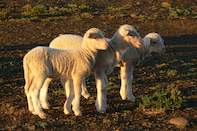
The National Wool Growers' Association of South Africa (NWGA) was founded during a Wool Conference in Middleburg in the Western Cape on 26 May 1926, and has since played a huge role in establishing South Africa as a leader in the production of good quality apparel wool.
The origins of the National Wool Growers' Association of South Africa can be traced back to when the first merino sheep arrived in South Africa in 1789, which today is the main sheep breed used for wool production in South Africa.
The Spanish government highly regulated the merino industry at the time, with only the king being allowed to move merino sheep out of the country. South Africa’s break came when King Charles the fourth of Spain gave two rams and four ewes to King William the fifth of Oranje-Nassau in the Netherlands.
The sheep did not thrive in the Netherlands, so were sent to South Africa. Here they were moved to the government farm, Groenkloof, near Cape Town, in the area that has since become known as Mamre. Spain, however, demanded their sheep back in 1791, arguing it did not give permission for the sheep to be sent to South Africa.
The commander at the Cape, Colonel Robert Jacob Gordon, in response sent six sheep back, while keeping the offspring, resulting in South Africa becoming the first country to acquire merino sheep outside the borders of Europe.
The first wool grower’s association was established in 1831 already, to promote merino wool production in the Cape. More associations in different regions were established as of 1906, leading to the realisation in 1924 that the industry needed a united body to represent it, which led to the launch of the National Wool Growers' Association of South Africa. Claude Orpen was elected as the first chairperson, TE Murray as the first vice-chairperson, and Gerhard Rood, the first secretary.
The NWGA had its first formal representative congress at the Bloemfontein Show on 18 September 1929. During the early years, it enjoyed the same status as provincial boards of the Agricultural Union and managed all sheep-related issues, even mutton and lamb meat production, until the Red Meat Producers Organisation was founded.
 Sheep farming is done all over South Africa, but is traditionally concentrated in the more arid regions of the country. Although the income ...
Sheep farming is done all over South Africa, but is traditionally concentrated in the more arid regions of the country. Although the income ...